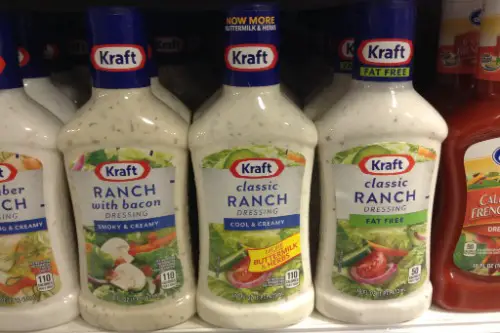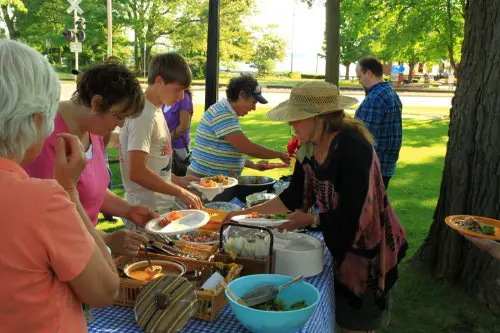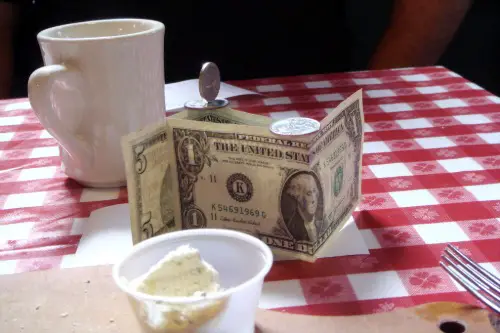1. How You Take Your Coffee

Whether you go black with no sugar or order a caramel ribbon crunch Frappuccino with oat milk and whip says a lot, according to Nicole Davis from Food52. Coffee choices in America aren’t just about caffeine—they’re wrapped up in identity. Black coffee might say you’re straightforward, no-nonsense, maybe even a bit old-school. Meanwhile, a frothy, sugary drink can scream creativity, indulgence, or even a little chaos.
People project a lot onto coffee drinkers—hipster, boomer, suburban mom, or tech bro. The brand matters too; drinking Dunkin’ vs. Starbucks vs. local roasters can define you socially. Your morning order is often shorthand for your routine, budget, and lifestyle. It’s practically your personality in a cup.
2. How You Feel About Ranch Dressing

In America, ranch dressing isn’t just a condiment—it’s practically a lifestyle choice. Some people will dunk anything in it: pizza, fries, even fried pickles. Others look at it like it’s some sort of dairy-based betrayal, Sarah Sweeney from VICE explains. If someone says they hate ranch, it’s usually followed by “I know, I’m weird,” which says a lot.
Your stance on ranch can reveal your relationship with comfort food, the Midwest, and how adventurous your palate really is. Loving it might suggest you’re laid-back or nostalgic for childhood snacks. Hating it might hint at a more cosmopolitan or health-conscious vibe. Either way, it sparks a surprisingly passionate conversation.
3. Whether or Not You Stand for the National Anthem

At a sporting event, when the anthem plays, all eyes subtly scan the crowd to see who stands—and who doesn’t. Your choice speaks volumes, whether it’s rooted in patriotism, protest, or just plain discomfort with public rituals, according to Jeff Haden from Inc.com. It’s become a deeply personal political gesture in the last decade. And people will judge you for it, one way or another.
Standing automatically codes you a certain way in the minds of others—maybe traditional, maybe conservative. Not standing often gets read as rebellious, progressive, or politically active. Some folks don’t care either way, but those who do care tend to really care. It’s less about the flag and more about where you stand on a dozen social issues.
4. If You Own a Gun

Gun ownership in the U.S. is one of those things that instantly signals your views on government, safety, and community, according to Ruth Igielnik and Anna Brown from Pew Research Center. If someone has a concealed carry permit or a whole safe full of rifles, that tells a story. If they wouldn’t even touch a BB gun, that tells another. There’s not much neutral ground here.
People who are pro-gun often see it as a right, a tradition, or a necessity. Those against it may associate guns with violence or systemic issues. Conversations about guns tend to escalate fast, so many people just avoid the topic unless they know where you stand. But rest assured, once it’s out there, people file that info away quickly.
5. How You Pronounce “Caramel”

Is it “car-mel” or “care-a-mel”? This tiny word somehow has enough weight to start a whole dialect debate. Regional differences, class background, and how often you hang out in Starbucks all play a role. And yeah, people notice which version you use.
While it might seem minor, it’s often a subtle indicator of where you’re from or what type of education you had. Linguistic quirks like this tend to stick with people emotionally. Say it the “wrong” way in the “wrong” crowd, and someone will definitely correct you. Whether you laugh it off or double down? That’s part of the personality test, too.
6. Your Opinion on Crocs

Love them or hate them, Crocs are a divisive piece of American fashion. Some people swear by the comfort and practicality—they’re the clogs of the modern age. Others wouldn’t be caught dead in them, citing crimes against style. Either way, Crocs tend to expose where you land on the form-vs-function spectrum.
Wearing Crocs proudly suggests confidence, maybe a disregard for trends, or a deep sense of irony. Hating them might indicate a more traditional sense of style or a fear of looking goofy. Then there are the people who own them but insist “only around the house,” which is its own category. Crocs reveal more about your aesthetic values than you’d think.
7. What You Bring to a Potluck

A store-bought tray of cookies? A carefully layered seven-bean salad? Just some napkins because you “didn’t have time”? Whatever you bring (or don’t) to a potluck says a lot about how you see community and responsibility.
People who cook from scratch often enjoy being the center of attention—or at least contributing meaningfully. Those who show up empty-handed might be busy, disorganized, or just not super invested. And if someone brings something obscure and dietary-friendly, they’re probably trying to be considerate and make a point. It’s all baked into the dish.
8. How You Feel About Pumpkin Spice

Pumpkin spice season is basically a national holiday for some people and a cultural eye-roll for others. If you’re running to Starbucks for the first PSL of fall, that tells us you like seasonal traditions and probably enjoy being cozy. If you mock pumpkin spice anything, you might pride yourself on resisting trends. And if you secretly love it but pretend you don’t—that’s another flavor of personality altogether.
This one’s not really about the spice—it’s about what it symbolizes. Basic-ness, nostalgia, suburban culture, Instagram aesthetics. People either lean in or reject it hard. And your stance tends to pop up every year like clockwork.
9. Where You Stand on Pineapple on Pizza

Ah yes, the debate that never dies. Do you embrace the sweet-and-savory life or reject the idea as culinary blasphemy? Americans are fiercely divided on this one, and there’s no middle ground without some raised eyebrows. It’s less about the fruit and more about your tolerance for flavor chaos.
People who defend pineapple on pizza often pride themselves on being open-minded or rebellious. Opponents usually feel they’re defending tradition and taste integrity. Some folks even use it as a quick way to test compatibility on dating apps. It’s a literal slice of your personality.
10. Your Take on Disney Adults

Disney adults—those who go to the parks often, wear the merch, and maybe even honeymooned at Disney—get a lot of attention. Some people find them whimsical and fun, others find them deeply unsettling. Whether you find joy or judgment in their lifestyle reveals your own approach to nostalgia, consumerism, and adulthood. And yes, people will categorize you based on your stance.
If you’re a Disney adult, you’re often seen as childlike (for better or worse) and big on joy. If you roll your eyes at the whole thing, you might be more grounded, skeptical, or minimalist. And then there are people who just want to avoid the conversation altogether. Which, again, is part of the test.
11. How You Feel About Working on Holidays

Do you think it builds character, or is it an injustice against humanity? Whether you’re clocking in on Christmas Eve or absolutely off-grid from Thanksgiving through New Year’s, your stance says a lot. Some people see holiday work as hustle culture, others see it as exploitation. And depending on your industry, this question hits very differently.
Those who volunteer to work holidays might be loyal, money-motivated, or just avoiding family drama. People who draw hard boundaries tend to value tradition or personal time. Either way, there’s a culture clash at play. Your choice sends a clear message about what you prioritize.
12. How You Decorate for Christmas

Are you inflating a 12-foot Santa in your front yard by November 1st, or are you a minimalist wreath-and-white-lights person? Holiday decor is a whole mood board of your values, tastes, and social affiliations. Americans have wildly different thresholds for festive expression. Some even wage neighborhood battles over light displays.
Big decorators are often seen as fun-loving, extroverted, and community-oriented. Minimalists might lean toward elegance, introversion, or just plain busyness. And then there are the people who don’t decorate at all—intentionally or not. That choice says more than any inflatable reindeer ever could.
13. Your Relationship with Amazon

Do you Prime everything or avoid the site on principle? Americans have wildly different relationships with Amazon, and it usually reflects how you weigh convenience vs. ethics. Some people rely on it for everything from toilet paper to TV shows. Others have cut it out completely, citing worker treatment or monopolistic behavior.
If you’re Team Amazon, you might be pragmatic, frugal, or time-strapped. If you’re anti-Amazon, there’s probably a deep ideological commitment behind that choice. And if you’re conflicted but use it anyway? Welcome to the moral gray zone most of us live in.
14. Whether You Say “Y’all”

Saying “y’all” isn’t just about being Southern—it’s about being inclusive, casual, and maybe a little charming. Some Americans say it naturally; others can’t bring themselves to utter it even when it’s clearly useful. If you say “you guys” or “you all” instead, people notice. And sometimes they read into it more than you’d expect.
“Y’all” users are often seen as warm, approachable, and maybe a bit nostalgic. Non-users may be seen as formal, regionally distinct, or just trying to avoid sounding “country.” Some folks adopt it later in life, especially online, and that brings a whole other layer. Your default second-person plural says a lot about your vibe.
15. How You Feel About Tipping

The tipping debate is the personality test at every American restaurant, café, or bar. Do you tip 20% automatically, or do you base it on service quality? Some people see tipping as respect for hard work in a broken system. Others think it’s a scam and prefer all-inclusive pricing.
Big tippers are often viewed as generous, empathetic, or service-industry savvy. Small or non-tippers might come across as frugal, principled, or just out of touch. And if you say “I don’t believe in tipping”? Oh, you’re starting a whole philosophical debate over brunch.


